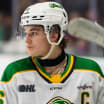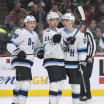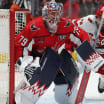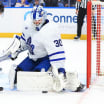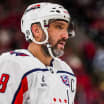Iginla overcame own doubts to reach Hockey Hall of Fame
Forward became elite scorer in NHL, won two Olympic gold medals with Canada
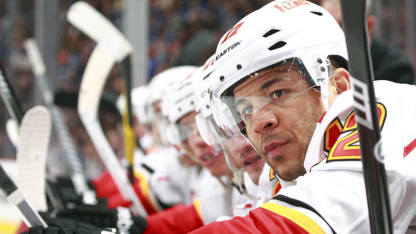
The forward had scored 50 points (21 goals, 29 assists) in his first season in 1996-97, finishing second to Bryan Berard in the voting for the Calder Trophy as NHL rookie of the year. But his second season was tough, with injuries, and he started slowly in his third, being held without a point in seven of his first 10 games in 1998-99.
Maybe, he started to wonder, this is all that he was: an average player, just happy to be in the NHL.
"I always dreamed that I was going to be in the NHL and be a goal-scorer in the NHL," Iginla said. "It was pretty tough again my third season] -- a little bit of a tough start -- and I remember saying, 'Well, thanks, I made the NHL and this is awesome and maybe I'm not going to be a top player or a goal-scorer, and that's fine. I made it. I've got to be thankful for that.'"
***[RELATED: [Iginla is Hall of Fame person]*
There's a sense of joy in his voice as he recounts the feelings, ones that were very real then. It is far easier to look back now that Iginla is in the Hockey Hall of Fame, now that he has scored 1,300 points (625 goals, 675 assists), now that he has solidified his place as one of the all-time greats.
He was one of five players inducted into the Hall of Fame in Toronto on Monday, joining Kevin Lowe, Doug Wilson, Kim St-Pierre and Marian Hossa. Longtime NHL general manager Ken Holland also was inducted, as a Builder.
Iginla's career got steadily better after that third season, with the points and confidence increasing -- he scored at least 94 points three times -- though Iginla said he never felt fixed in his career, never felt like he had it easy, never felt assured. He wonders what it must be like for the "top guys," as he put it, for Sidney Crosby, for Alex Ovechkin, for Connor McDavid, perhaps discounting that his name belongs alongside theirs.
"I look at them, I'm thinking, man, they must just show up, it's easy today," he said, wonderment in his voice. "Just smooth."
After being selected in the first round (No. 11) of the 1995 NHL Draft by the Dallas Stars, the Edmonton native played 20 seasons in the NHL, including his first 16 with the Calgary Flames before moving on to the Pittsburgh Penguins, Boston Bruins, Colorado Avalanche and Los Angeles Kings. He is tied with Joe Sakic for 16th on the NHL goals list and ranks 36th in points. In 2001-02, he won the Art Ross Trophy as the NHL points leader with 96 (52 goals, 44 assists); the Rocket Richard Trophy as the leading goal-scorer; and the Ted Lindsay Award (then the Lester B. Pearson Award) as the most outstanding player, as voted by his peers. He also won the King Clancy Memorial Trophy for leadership and community contributions and the Richard Trophy in 2003-04, and the Mark Messier Leadership Award in 2008-09.
He competed in three Olympics for Canada, winning two gold medals, but nothing put him into the cultural conversation like his feed to Crosby for the Golden Goal in overtime against the United States at the 2010 Vancouver Olympics, giving Canada the gold.
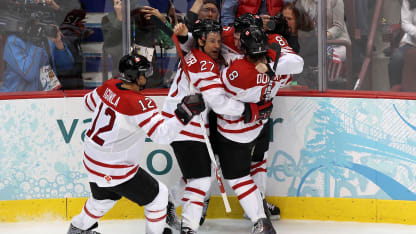
© Alex Livesey/Getty Images
And still, even as Iginla doubted, few others ever did.
"Right away you could tell the talent on the ice," said former Flames teammate and current TSN hockey analyst Jamie McLennan. "You're like, God, this guy's got everything. He's got a shot and he's big and he can skate and, in an era where fighting was maybe more predominant in certain areas, he enjoyed it."
Iginla also achieved a host of firsts for Black players in the NHL, including scoring 400, 500, and 600 goals, and 1,000 points. He was also the first Black male athlete to win a gold medal at the Winter Olympics, winning for Canada in 2002.
"I do take pride [in it] and it was an honor to be a Black player in the NHL," Iginla said. "When I was growing up, it truly was very important to me to see other Black players in the NHL and to see the possible.
"Black young players [would say] to me they watched me and I helped inspire them, and that meant a lot to me, because I do know the feeling that I had looking at Grant Fuhr and watching Claude Vilgrain and trying to follow the Black players that were in the NHL before me."
With his induction into the Hockey Hall of Fame as a member of the Class of 2020, postponed by one year because of the coronavirus, he became the fourth Black person inducted, following goalie Fuhr, women's hockey pioneer Angela James and Willie O'Ree, the first Black player in the NHL and the League's diversity ambassador, who was inducted in the Builders category in 2018. Only Fuhr and Iginla are honored by the Hall primarily for their on-ice achievements in the NHL.
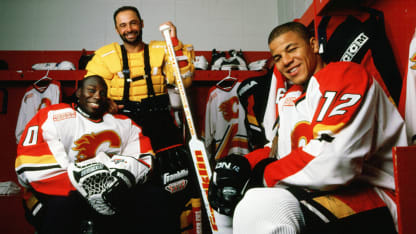
© Ronald C. Modra/Getty Images
"As you progress through your career, you want to see the game advance," Fuhr said. "To see Willie go in, to see Angela go in, and now to see Jarome go in, it shows that the game's advancing. … There couldn't be a better role model. I think that's the great thing: Jarome's just a fantastic role model for any player."
\\\\
After being drafted by the Stars, Iginla was traded to the Flames with center Corey Millen for center Joe Nieuwendyk on Dec. 19, 1995. He was greeted in Calgary with the headline "Jarome Who?" Even then-Flames general manager Al Coates admitted he didn't know exactly the caliber of player they had acquired.
"Did you know you were getting a superstar player?" Coates said in 2013. "The answer to that is no. I would challenge anybody on our staff who helped me with this to have a different opinion on that."
But they called him up after his season was over for Kamloops of the Western Hockey League, throwing him into Game 3 of the Western Conference Quarterfinals in 1996. He had an assist in that game, his NHL debut, and a goal in Game 4, but the Flames were swept by the Chicago Blackhawks in the best-of-7 series.
"I didn't expect to play and all of a sudden I was on the first line," Iginla said. "I got to center Theo Fleury and German Titov on the first line and I was lining up against Jeremy Roenick, going into corners with [Chris] Chelios, literally shooting on Eddie Belfour."
His career would take off, even if he didn't always feel like it did, though his doubts finally seemed to abate after he got a late invitation to Canada's camp ahead of the 2002 Salt Lake City Olympics after an injury to Simon Gagne.
"When I got there and I played with them I didn't stand out in the games or anything, it wasn't like that, but I just felt like I belonged out there," Iginla said. "Like I could hold my own. This is Team Canada, some of the best players in the world, and I'm out here and I'm doing all right."
He soared from there, making his mark as a gifted goal-scorer, a fighter, a fearsome competitor.
"There weren't a lot of guys that could score 30 goals every year plus play any other role that teams needed," said Fuhr, who played with Iginla in 1999-2000 with the Flames. "He could be the tough guy if he had to. He could be the finesse guy if he had to. He could be the agitator if he had to. Not a lot of guys can play all those roles."
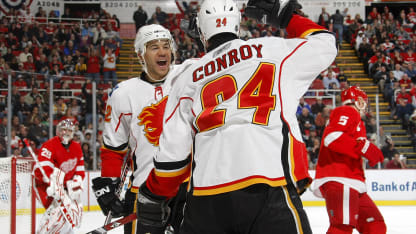
© Dave Sandford/Getty Images
And that competitive side was legendary.
When teammate Craig Conroy would go to Iginla's house for Christmas, the order was always to bring his skates, with the idea that they would spend time out on the backyard rink. But not just anyone was allowed on the ice.
"We both wanted to win that game," Conroy said. "It wasn't like you go out and you're just playing around. The kids weren't even allowed to come on the ice because we were going to go full-on. That's what it was like with Jarome."
It wasn't just on the ice, either. It was video games on the team plane. It was the board game Risk and the card games over Zoom during the COVID-19 pandemic. It was in everything.
"The thing that never changed from Day One to day-whenever was his feistiness, his shot, his ability, his team-first mentality," said former NHL coach Bruce Boudreau, who coached against Iginla. "And that's the thing I always noticed about him. If one of our guys hit one of their guys dirty, it would be Jarome the captain that would be coming over to do the protection."
\\\\
Which is to say that the captaincy was always meant to be.
Even though those around him didn't understand the decision, Conroy said he knew that by the 2003-04 season, it was right for him to step aside. Bob Boughner, the co-captain with Conroy for the previous two seasons, was gone, and Conroy said he felt it was truly Iginla's team.
"He was the leader," Conroy said. "Everyone knew it."
By the end of that season, when Iginla tied Ilya Kovalchuk and Rick Nash for the NHL lead with 41 goals, the Flames would make the Stanley Cup Playoffs for the first time since 1996 and reach the Stanley Cup Final, losing in devastating fashion to the Tampa Bay Lightning.
They led the series 3-2 but lost Game 6 3-2 in double overtime at home and lost 2-1 in Game 7 at Tampa Bay. Iginla never got that close again. It is a moment that he said still hurts.
But, as McLennan said, "That's when 'Iggy' put a stamp on how great he was."
And, as captain, Iginla wove a legacy that would leave friends and teammates to talk as much about his off-ice persona as his on-ice exploits.
"You'll never find a better ambassador to the game," Conroy said. "To take time with fans, to do things for other people. It's weird because there's the fierce competitor when he comes on the ice -- and he's ruthless out there, the trash-talking, he'll fight, do whatever he has to do to win -- but when he gets off the ice and puts on a suit, he's one of the nicest, most caring, generous human beings you're ever going to meet."
That is the constant refrain. That as great as Iginla was on the ice, that along with the gold medals and the goals and the points, the person that Iginla is has meant so much more. That his legacy extends off the ice and into the community, into the lives of those who know him and those who look up to him.
"I'm going to say this, and I'm extremely biased, but I hold the standard to the way athletes and people should live their lives, and Jarome sets that standard," McLennan said. "He's such a great mentor, such a great example of how you should carry yourself when you have success and when you are fortunate enough to be blessed in certain things.
"He's a special, special person. That's not just the hockey stuff. He's the benchmark that a lot of us live our lives by."

